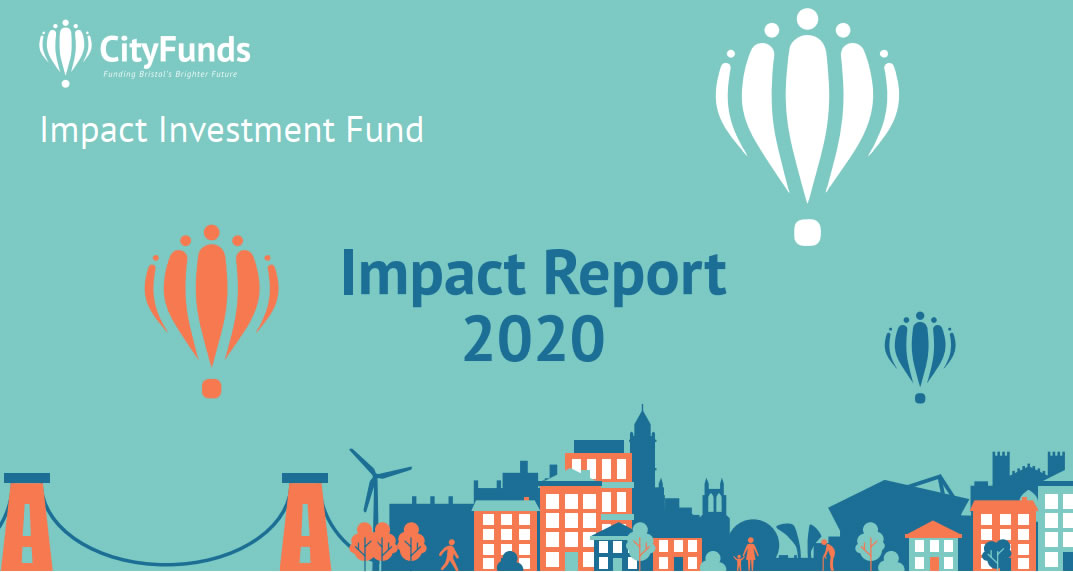
Local impact fund invests over £2.4m to #BuildBackBetter in Bristol
-
City Funds investment into Bristol totals £2.4m in 2020
-
Funding supports communities addressing social and environmental challenges
-
Research reveals areas most in need of investment to #BuildBackBetter in 2021
City Funds committed over £2.4 million to the local social economy in 2020 as part of a citywide strategy supporting community response to the COVID-19 pandemic. The local impact investor has already distributed £625,000 and has a further £1.8 million committed to similar initiatives. The City Funds impact report, released today, reveal key investments that are creating economic, community and environmental resilience in Bristol as a response to COVID-19.1
As part of a Build Back Better approach, City Funds is using an investment strategy that fills a financial gap for organisations using social enterprise to solve local social and environmental challenges. One of the first funds of its kind in the UK, the impact fund brings together investment, grant and local authority support in a coordinated place-based approach to investing. With different types of funding under one roof, City Funds strengthens Bristol-based initiatives that otherwise may be unlikely to secure the funding they need.
Organisations that received investment in 2020 include:
-
Ambition Community Energy to build a 4.2Mw wind turbine, and create £1.5m in surplus to address local fuel poverty,
-
Talking Money to rebuild and grow their support for individuals caught in the cycle of indebtedness,
-
Wellspring Settlement to purchase The Swan Pub in Barton Hill and create new community space and affordable housing, and
-
Frank Water to expand their sustainable water operations and implement a water action programme in Bristol schools.
A further £1.8m has been committed in 2020 across five further investments that will soon complete in social care and mental health services, affordable housing and a community capital project.
Andy Street, Chair of City Funds, said: “As an impact investor, we’ve seen how the ongoing pandemic has disproportionately affected those living in the context of long-term economic, social, and environmental inequality. This has highlighted more clearly than ever the need for a local and democratic approach to finance that is targeted and effective. By investing in this way, City Funds is contributing to a fairer and more sustainable future in Bristol.”
City Funds is also strengthening the social enterprise sector to address future challenges. Through its investment advisor Bristol & Bath Regional Capital (BBRC), City Funds partners with organisations at an early stage to strengthen both financial and impact strategies. Their annual investee survey concluded:
-
100 per cent of investees reported that finding mission-aligned investment elsewhere would be considerably or highly unlikely
-
Three quarters of investees responded by saying that City Funds had a positive impact on their business model
-
75 per cent of investees said that funding from City Funds enabled them to pursue their mission to a great extent
Laura Barrow, Finance Director at BBRC, said: “The City Funds vision is to see a thriving and healthy Bristol, built on fair social foundations, within sustainable environmental limits. We know that social enterprises are absolutely key to this vision. The resources and expertise at BBRC are fully focused on strengthening this sector, and ensuring that money is mission-shaped, not the other way around.”
Flexible investment terms allow BBRC to design the best financial structure for each organisation’s long-term success, working with each project on a case-by-case basis on the investment amount, rate, term and repayment schedule that best unlocks resilient solutions for Bristol. The fund can invest anywhere from £50,000 to £1 million, through loans, equity, or sharia-compliant structures. The fund size is currently £10 million and will continue to invest strategically, helping investees solve some of the biggest problems facing Bristol and its communities.
Research points to five specific areas of investment as Bristol looks to mitigate the economic and social damage of COVID-19. These are:
-
Mental health services
-
Inclusive digital infrastructure
-
Retraining and re-skilling
-
Local circular economy
-
Sustainable and low-cost transport
City Funds is exclusively focussed on investing in Bristol, and therefore has local insight that other lenders may lack and can assess each project on its specific local value. As a result of this unique place-based investing approach, City Funds is able to invest in strategic sectors to help build back better.
Cornerstone investors are Big Society Capital, the UK’s leading social impact investor, and Bristol City Council who have committed £5 million each. In the UK, impact investing is now worth £2.3 billion2, yet this investment marks the first time Big Society Capital has engaged in a collaborative place-based investing approach, aiming to reduce inequality in a geographic location whilst also generating a financial return for investors.
James Burrows, Senior Investment Director at Big Society Capital, said: “City Funds is demonstrating the role social impact investment can play within places across the UK when it connects with local partners and local priorities. Big Society Capital is delighted to see the fund break through this fantastic milestone. It’s encouraging to see investment, grants and local authority support coming together to help the social economy of Bristol thrive. At times such as now, when the incredible work of social enterprises and charities is needed in the city more than ever, we look forward to even more organisations using this finance to strengthen the community.”
As an example of Bristol’s One City Approach, City Funds is a strategic partnership between BBRC, Quartet Community Foundation and Bristol City Council. The One City Approach is a sustained effort to work across sectors to create solutions to Bristol’s continued inequality. City Funds is using the One City Approach to create greater levels of transformation than multiple different transactions made in silos, which has proven inadequate to generate long-term solutions.
Posted: Mar 2021